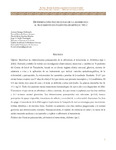
Please use this identifier to cite or link to this item:
http://ricaxcan.uaz.edu.mx/jspui/handle/20.500.11845/963| Title: | Determinantes psicosociales de la adherencia al tratamiento en pacientes diabéticos tipo 2 |
| Authors: | Noriega Maldonado, Adriana García Zamora, Pascual Gerardo Sánchez Morales, Flor de María Zegbe Domínguez, Jorge |
| Issue Date: | 3-Mar-2017 |
| Publisher: | Universidad Autónoma de Zacatecas |
| Abstract: | Objetivo:Identificar los determinantes psicosociales de la adherencia al tratamiento en diabéticos tipo 2(DM2). Materialesy métodos: Se realizó una investigación observacional, transversal y analíticaen 70pacientes del Centro de Salud de Tacoaleche, basada en su último registro clínico mensual, glicemia,número deasistencia a citasy laaplicación deun instrumentoque incluyó variables sociodemográficas, de la enfermedad y psicosociales. La información fue sometida a pruebas deji-cuadrada. Resultados.El 65.7por ciento fueron mujerescon 57añosde edad, el 54.3por ciento con primaria incompleta y 14.3analfabetas. El 52.9por ciento eran amasde casay el resto se dedicaba aotras actividades.La glucosa promedio fue de 170.1mg/dl. Todos los pacientes tenían tratamiento farmacológicodenueveaños con diagnóstico de DM2. Únicamente 10por ciento se adhirieron a dieta y ejercicio, 28.6por ciento cumplieron con las citasmédicas y 21.4tuvieron control glucémico. Los determinantes psicosociales más relevantes (p>0.05) fueron: percepción de apoyo disponible, intenciones de adherir y severidad de la enfermedad. Conclusiones.La falta de apego al tratamiento de laDM2sugiere implementar la búsqueda de nuevas estrategias para incrementar hábitos dietéticosy deejerciciofísico. Tambiénla asistencia a las citasmédicas programadasy el control glicémicoson determinantes cruciales. Psicosocialmente,el modelo de creencias en salud y la teoría de la acción razonada ayudaron a comprender y explicarlaadherenciaal tratamiento. Palabras clave: Factores psicosociales, adherencia al tratamiento, diabetes tipo 2. |
| Description: | Objective:To identify the psychosocial factors determiningthe treatment adherence in type 2diabetics (DM2). Materialsand methods: An observational, cross-sectional,and analyticalresearch was performedin 70patientsof the Health Center of Tacoaleche, based on the latestmonthly clinical record,glycemic,number of attendedappointments, and an instrument application that included variables socio-demographics,from the same disease,and psychosocial.Data were submitted to chi-square tests.Results. The 65.7percent were women with 57-yearsold, 54.3percent of them with incomplete elementary education, and 14.3percent illiterate. The 52.9percent was housewivesand the reminder women were devoted to other activities.The average of glucose was170.1mg/dl. All patients had drug treatment with nine years withDM2diagnosis.Only 10percent adhered to diet and physical exercise, 28.6percent attended to the medical appointments, and21.4percent had glycemic control. The most relevant psychosocial determinants (p>0.05) were:perception of available support, intentions to adhere, and disease severity.Conclusions.The lack of adherence to treatment to theDM2suggests implementing the search for new strategies to increase dietaryand exercisehabits. The attendance at scheduled medical appointments and glycemic control are also crucial factors for DM2control.Psychosocially, the health belief model and the theory of reasoned action helped to understand and explain adherence to the treatment.Key words:Psychosocialfactors, adherence to the treatment, type 2diabetes. |
| URI: | http://ricaxcan.uaz.edu.mx/jspui/handle/20.500.11845/963 |
| ISSN: | 2594-0430 |
| Other Identifiers: | info:eu-repo/semantics/publishedVersion |
| Appears in Collections: | *Documentos Académicos*-- UA Medicina |
Files in This Item:
| File | Description | Size | Format | |
|---|---|---|---|---|
| Determinantes.pdf | 554,16 kB | Adobe PDF |  View/Open |
This item is licensed under a Creative Commons License
